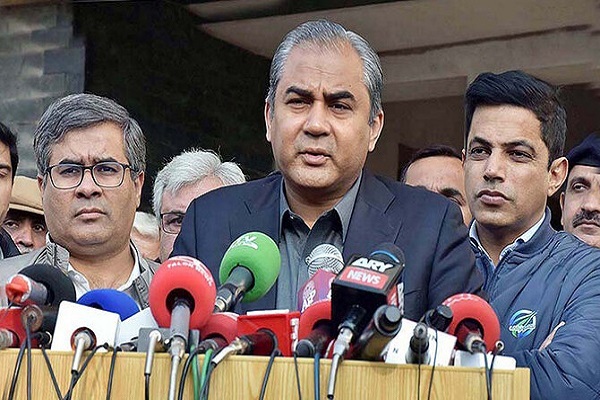AhlulBayt News Agency: Action should be taken against individuals and groups misusing Islam to incite “terrorism,” the interior minister of Pakistan said.
Mohsin Naqvi on Friday also called for unity among all segments of society to defeat militancy amid a surge in attacks across the country in recent months.
Earlier this week, Naqvi had announced plans to consult religious scholars from different sects to develop a unified narrative in the war against terror.
The efforts come nearly two weeks after separatist militants killed over 50 people in the country’s largest province of Balochistan in a string of coordinated attacks on army and paramilitary camps, police stations, railway lines and highways on the night of Aug. 25-26.
Elsewhere in the country, particularly the northwestern Khyber Pakhtunkhwa province, religiously motivated groups like the Pakistani Taliban have also stepped up attacks, daily targeting security forces convoys and check posts, and carrying out targeted killings and kidnappings of security and government officials.
“The most important thing is that we unite as Pakistanis. Paths of those who are leading people astray by misusing Islam to foment terrorism should be stopped,” Naqvi said on Friday as he addressed a meeting of religious scholars.
“We have to get out of this fire [of terrorism] which we can’t without your help [religious scholars].”
Pakistan has also been wracked in recent years by so-called blasphemy protests by hard-line religious groups, and lynchings over the issue are common in the Islamic republic where blasphemy can legally carry the death penalty. Legal processes are frequently preceded by vigilante action based on rumors or complaints.
Speaking about these issues, Naqvi stressed the importance of involving religious scholars from all schools of thought to formulate a strategy against “extremism.”
He reiterated the government’s stance that anyone taking up arms against the state would be considered a “terrorist” and killing individuals in the name of Islam was neither permitted by the religion, nor Pakistani laws.
Naqvi announced that Religious Affairs Minister Chaudhry Salik Hussain would accompany him on a trip to all provinces along with ulema leaders to spread the “true message” of Islam.
“We have to give the same message that using Islam for wrongful purposes needs to be stopped,” he said.
“The interior and religious ministry will work with you [ulema] together and follow your suggestions. We have to give a strong message in this regard.”
Pakistan has blamed the recent surge in attacks on regional neighbors, including Afghanistan, where it says the coming to power of the Afghan Taliban in 2021 has emboldened anti-Pakistan groups like the Tehreek-e-Taliban Pakistan (TTP). Kabul says it does not allow its territory to be used by terror groups.
Pakistan also says that India and Afghanistan are fomenting militancy in Balochistan, which borders Iran and Afghanistan and has been the site of a decades-long separatist insurgency. Ethnic Baloch militants say they are fighting for secession due to what they see as the unfair exploitation of the province’s mineral and gas wealth by the federation, which denies the charge.
/129
Mohsin Naqvi on Friday also called for unity among all segments of society to defeat militancy amid a surge in attacks across the country in recent months.
Earlier this week, Naqvi had announced plans to consult religious scholars from different sects to develop a unified narrative in the war against terror.
The efforts come nearly two weeks after separatist militants killed over 50 people in the country’s largest province of Balochistan in a string of coordinated attacks on army and paramilitary camps, police stations, railway lines and highways on the night of Aug. 25-26.
Elsewhere in the country, particularly the northwestern Khyber Pakhtunkhwa province, religiously motivated groups like the Pakistani Taliban have also stepped up attacks, daily targeting security forces convoys and check posts, and carrying out targeted killings and kidnappings of security and government officials.
“The most important thing is that we unite as Pakistanis. Paths of those who are leading people astray by misusing Islam to foment terrorism should be stopped,” Naqvi said on Friday as he addressed a meeting of religious scholars.
“We have to get out of this fire [of terrorism] which we can’t without your help [religious scholars].”
Pakistan has also been wracked in recent years by so-called blasphemy protests by hard-line religious groups, and lynchings over the issue are common in the Islamic republic where blasphemy can legally carry the death penalty. Legal processes are frequently preceded by vigilante action based on rumors or complaints.
Speaking about these issues, Naqvi stressed the importance of involving religious scholars from all schools of thought to formulate a strategy against “extremism.”
He reiterated the government’s stance that anyone taking up arms against the state would be considered a “terrorist” and killing individuals in the name of Islam was neither permitted by the religion, nor Pakistani laws.
Naqvi announced that Religious Affairs Minister Chaudhry Salik Hussain would accompany him on a trip to all provinces along with ulema leaders to spread the “true message” of Islam.
“We have to give the same message that using Islam for wrongful purposes needs to be stopped,” he said.
“The interior and religious ministry will work with you [ulema] together and follow your suggestions. We have to give a strong message in this regard.”
Pakistan has blamed the recent surge in attacks on regional neighbors, including Afghanistan, where it says the coming to power of the Afghan Taliban in 2021 has emboldened anti-Pakistan groups like the Tehreek-e-Taliban Pakistan (TTP). Kabul says it does not allow its territory to be used by terror groups.
Pakistan also says that India and Afghanistan are fomenting militancy in Balochistan, which borders Iran and Afghanistan and has been the site of a decades-long separatist insurgency. Ethnic Baloch militants say they are fighting for secession due to what they see as the unfair exploitation of the province’s mineral and gas wealth by the federation, which denies the charge.
/129

